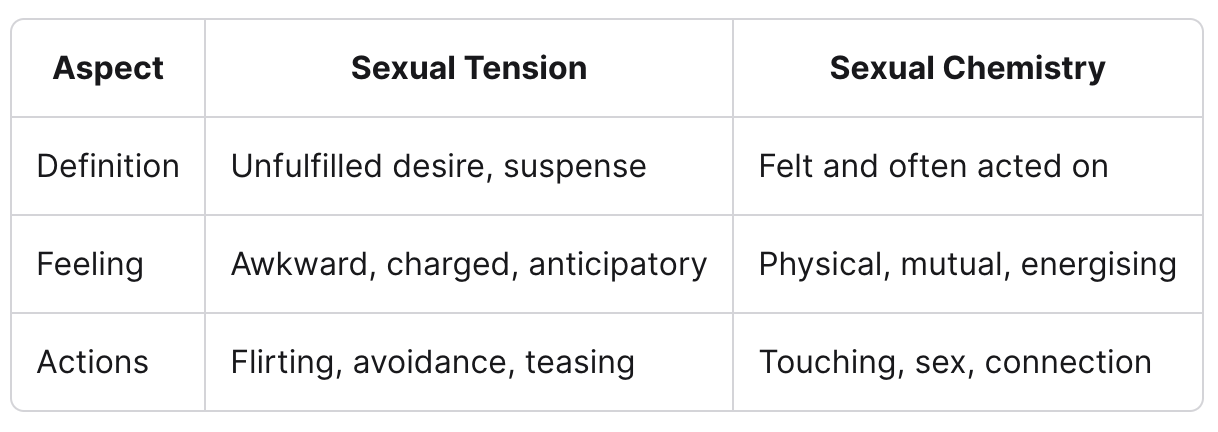Welcome to the ultimate, non-twisty deep dive on one of the most electrifying—and sometimes awkward—human experiences. If you’ve ever felt the air buzz between you and someone else, wondered “Are we just friends or is there something more?” or found yourself daydreaming about a certain somebody... you’ve likely felt sexual tension.
Let’s talk about what is sexual tension, why it happens, how to spot it, and how to handle it—whether you want to fan the flame or extinguish it.
What is Sexual Tension?
Let’s get straight to the point: sexual tension is the unsaid, unacted-on electricity felt between two people who are attracted to each other. Picture the classic will-they-won’t-they scenario in movies or the unspoken glances in the office that could melt a block of ice. The keyword “what is sexual tension” isn’t just a mystery for poets and screenwriters—it’s something everyone experiences, regardless of age, background, or relationship status.
If the concept makes you blush or grin, don’t worry. By the end of this guide, you’ll not only know what sexual tension means—you’ll be able to spot, understand, and handle it like a pro.
Key Features
- Mutual or single-sided attraction
- Restraint or uncertainty about acting on desire
- Increased anticipation and emotional charge
The Science & Psychology Behind Sexual Tension
Brain Chemistry: Hormones at Play
If sexual tension had a mascot, it would be your hormones in a wrestling match. Scientists say sexual tension arises from a heady mix of adrenaline, dopamine, testosterone, oxytocin, and norepinephrine. These chemicals make your heart race, palms sweat, and thoughts wander—especially when you’re near someone you find attractive.
Why Hormones Go Wild
- Adrenaline: Heightens excitement and awareness.
- Dopamine: Fuels desire and anticipation.
- Testosterone/Estrogen: Drives sexual urge.
- Oxytocin: Deepens emotional bonds (hello, butterflies!).
Social Factors & Context
Where and how sexual tension occurs is often influenced by social rules. Office romances, flirtations between friends, secret crushes—the tension gets dialled up when acting on desire could have real-life consequences, like risking a friendship or breaching workplace boundaries.
Developmental & Emotional Triggers
Sexual tension doesn’t appear out of thin air. Sometimes people become attracted to someone who reminds them of a comforting experience or triggers a familiar emotional response. For others, emotional closeness—a sense of caring, laughter, shared secrets—feeds into the tension.
How Sexual Tension Feels: Signs & Symptoms:
Ever thought, “Is it just me, or is something more going on?” Let’s decode the signals. Some are obvious, some are subtle, and some are so awkward they deserve their own sitcom.
Physical Signs
- Quickened pulse and sweaty palms
- “Butterflies” in your stomach
- Expanded pupils
- Leaning in during conversation
- Intense eye contact (looking away bashfully counts!)
- Feeling flustered or nervous when the person is near
- Responding strongly to physical touch
Emotional Signs
- Daydreaming or fantasising about the person
- Racing thoughts (“Do they feel it too?”)
- Sudden mood shifts when talking about attraction
- Feeling giddy, anxious, or awkward in their presence
Behavioral Signs
- Flirting or teasing
- Making excuses to be around them
- Increased texting or communication
- Joking with sexual innuendo (subtle or not-so-subtle)
- Prolonged or meaningful conversations
- Friends and coworkers point out “the vibe” or tease you both.
Sexual Tension vs Sexual Chemistry: What’s the Difference?
While both sexual tension and sexual chemistry are about attraction, sexual tension is all about the suspense—the anticipation that hasn’t yet turned into physical intimacy. Sexual chemistry, on the other hand, is what happens when mutual attraction is present, and often when things progress to flirting, touching, or sex itself.

Sexual Tension in Various Relationships
Sexual Tension Between Friends and Colleagues
How It Manifests
- Friends: If you’ve ever shared inside jokes, playful teasing, and a palpable “vibe” with a friend that leaves you blushing or overthinking, you’ve experienced sexual tension. This isn’t just about romance; it’s often a mix of emotional intimacy and physical attraction left unspoken.
- Colleagues: Sexual tension at work can be more complex, often fueled by proximity, shared projects, and casual camaraderie. Spending long hours together or connecting instantly can foster unspoken attraction. Even light-hearted teasing from coworkers can make the tension more apparent.
Navigating Tension Professionally
- Recognise boundaries: Professional settings require extra caution. Workplace relationships may result in HR complications, unwanted attention, or power imbalances.
- Communicate with clarity: If feelings persist, consider an open and honest conversation—always respecting policies and boundaries.
- If tension is unwanted: Politely assert boundaries (“I’m not comfortable with that”), and if needed, involve HR to prevent escalation.
Sexual Tension in Romantic Partners
How It Feels
- Flirting, playful banter, nervous energy, and lingering touches—these are all classic signs of sexual tension in romantic relationships or budding romances.
- Even established couples experience sexual tension, especially during periods of emotional or physical distance.
Building Sexual Tension
- Playful Teasing & Banter: Keep things light, witty, and flirty—let innuendo and inside jokes fan the flames.
- Lingering Eye Contact: A subtle, extended glance can speak volumes.
- Delayed Gratification: Purposefully postponing sexual intimacy can heighten anticipation and desire.
- Physical Touch: Small, meaningful gestures (hand holding, gentle touches) build connection.
- Novelty & Surprise: Try new activities together to keep the relationship dynamic and exciting.
- Steamy Communication: Exchange suggestive texts or calls to keep the spark alive, especially if physical contact isn’t possible.
- Mutual Respect: Always ensure that both parties feel comfortable and enthusiastic about building tension.
Sexual Tension in Long-Distance & Unfulfilled Relationships
Challenges
- The inability to have regular physical contact can lead to intense sexual frustration and longing in long-distance scenarios.
- Sexual tension may build through video calls, texting, and shared anticipation of reunions.
Managing and Building Tension
- Schedule Visits: Whenever possible, physical reunions offer an outlet for built-up tension.
- Creative Communication: Use technology—texting, video calls, sexting, and virtual intimacy—to bridge gaps.
- Safe Exploration: For some, open discussions about alternative forms of physical intimacy (like mutual masturbation, use of sex toys, or playful online interactions) can provide healthy outlets.
- Discuss Expectations: Having open dialogue about needs, jealousy, and boundaries is essential for trust and satisfaction.
How to Build Sexual Tension—Intentionally
If your goal is the slow burn, these strategies work in friendship, romance, and long-distance relationships:
- Lingering eye contact (but don’t stare—save that for horror movies).
- Playful teasing and banter.
- Suggestive compliments (“that outfit ought to be illegal”).
- Light physical contact—even the briefest touch speaks volumes.
- Inside jokes with subtext or double meaning.
- Let things go unsaid (sometimes, restraint is magnetic).
- Explore intellectual connection—deep, passionate conversations are powerful.
Remember, mutual interest and enthusiastic consent are non-negotiable.
Navigating Sexual Tension: Boundaries, Tips & Etiquette
When Tension Is One-Sided
- Look for reciprocation: Does the other person flirt back, mirror body language, or seek your company? If not, step back and respect their space.
- Avoid escalation: If you sense your feelings aren’t returned, shift focus and nurture a platonic connection.
When Tension Is Unwanted
- Assert boundaries: Directly communicate discomfort (“I prefer we keep things friendly”), or escalate to HR in a work context for repeated advances.
- Redirect your energy: Dive into projects, socialise with other friends, or invest in self-care to cool down unwanted tension.
Healthy Communication
- Be honest but tactful: If you’re curious about mutual feelings, ask open-ended questions like “Do you sense anything between us?”
- Accept their answer: Whether it’s interest or a firm “no,” grace and respect pave the way for healthy relationships.
- Continued awkwardness: Sometimes, space and time allow tension to fade naturally.
Pro Tips for Handling Sexual Tension Like a Pro
- Acknowledge it: Self-awareness is key—recognise attraction so it doesn’t control you unconsciously.
- Set Boundaries: Define what’s OK and what isn’t—especially in work or platonic contexts.
- Redirect Focus: If tension is uncomfortable or disruptive, channel your energy into something productive.
- Clarify Intentions: Know what you want—a relationship, adventure, or simply the thrill?
- Seek Support: If sexual tension leads to emotional confusion, a therapist or trusted confidant can help you navigate feelings.
Final Thoughts
Sexual tension is one of those universal experiences—exciting, sometimes nerve-wracking, and at its best, deeply human. Whether you’re currently tiptoeing around someone, daydreaming about your crush, or simply curious, understanding sexual tension is key to navigating relationships with confidence, empathy...and, let’s be honest, a little bit of fun.
Breathe easy; now you’ve got the insider’s guide. Just remember: a little tension keeps life interesting, but mutual respect and clarity always come first.


.png)
.jpg)



